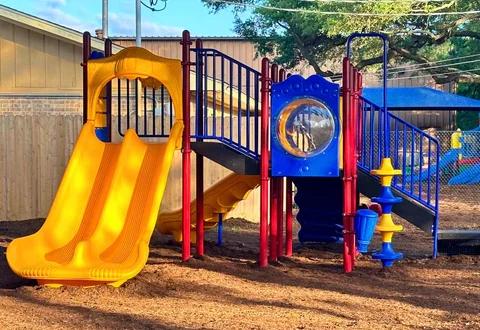Introduction: Childcare is more important than ever
The importance of child care in a child’s life is unquestionable. The care that children receive during their formative years, whether it is at home, a daycare, or from a nanny, can have a profound impact on who they will become. It impacts how children learn, behave and form relationships.
The demand for high-quality child care is increasing rapidly today, as more parents are working full time. Child care is more than just convenience. It’s about love, safety, education and emotional support.
This guide will teach parents, guardians and caregivers how to give their children the best possible start in life.
1. Understanding Early Childhood Development: The First Five Years of Life.
The brain of a child grows more rapidly during its first five years. Children learn the following during this time:
- Language and communication
- Emotional regulation
- Problem-solving skills and reasoning
- Motor coordination and physical coordination
- Trust and social behaviour
Engaging activities, positive interaction, and consistent routines are all ways to support quality child care in these areas.
What we invest in in the early years of childhood will be reflected in society for many years to come.
2. Find the right type of child care for your family
There is no one size that fits all. Parents should select the type of care that best suits their values, lifestyle, and child’s personality.
2.1 In-home care (Nanny or relative)
- Personal attention
- Familiar environment
- Flexible with your hours
Family Child Care Homes
- They often abuse caregivers in their own homes
- Smaller groups of mixed-age
- Centres are often less expensive.
Child Care Centers
- Facilities with licensed staff and trained personnel
- Social and structured programs
- Curriculum and classrooms for different age groups
2.4 Early Childhood Education Programs
- Focus on education
- Preparing children for Kindergarten
- Included are often arts, music and physical activities
Each option has advantages. The most important thing is to ensure that the care you receive is of high quality, regardless of where it takes place.
3. What Qualifies Child Care as “High-Quality”?
Look for these features when evaluating a childcare facility:
The Staff is Trained and Caring
- Early Childhood Education or Certification is required for all staff
- Respectful and warm communication between children and adults is a good sign.
- Ask about staff turnover – consistency is important for bonding.
3.2 Clean and Safe Environment
- Children-proofed areas and emergency exits are required.
- Updated licenses and safety checks
- Drop-off and pickup procedures
Engaging, age-appropriate activities
- Play-based learning is not only worksheets or screens
- Playing outdoors and engaging in physical activity
- Storytelling, group time and creative projects
Strong Parental Communication
- Reports or updates daily on mood, mood, meals and naps
- Visitor policy of open-doors
- Scheduled Parent-Teacher Meetings
4. Play is a powerful tool for child development
Playing is not an extravagance; it’s how children learn. Play allows them to explore the world, express themselves and develop critical thought.
Types of play:
- Creative Play: Drawing, coloring, crafting
- Imaginative play: Role-playing games, pretend games
- Active Play: Running, jumping, dancing
- Social play: Learning to share and have fun with others.
Children learn through play. In the play, children are taught how to learn.
Playing builds confidence, encourages exploring, and strengthens brain development.
5. Emotional security: the heart of good childcare
It is more likely that children who feel safe and loved will thrive. The caregiver, whether it is a parent, nanny or teacher, must develop a secure attachment to the child.
This means:
- When a child is upset, comfort them.
- Consistency and predictability
- Encourage independence in a gentle way
- Interested in someone?
A strong bond between caregivers and children helps to build trust and emotional resiliency, which are important for school readiness and social skill development later on.
6. What are the challenges parents face, and how can they overcome them?
Even the best of situations can be difficult. Here are some tips on how to overcome common obstacles.
Separation Anxiety
- Short separations are recommended before full-time childcare
- Even if you cry, always say goodbye. It builds trust.
- Allow children to take a comforting item (blanket or toy).
Selecting the Right Provider
- Interview multiple nannies or visit several centres
- Check reviews and ask for references
- Watch how the staff interacts with children
Balance Work and Parenting
- Talk to your employer about flexible working hours
- Establish routines for quality time (such as bedtime stories or weekend walks).
- Quality is more important than quantity.
7. Child Care and Culture – Respecting Identity and Diversities
The best childcare environments respect each child’s background, culture, and language, fostering a feeling of pride and belonging.
You can ask your child care provider if:
- Celebrate cultural holidays and traditions
- Use books and toys to represent diverse ethnicities and abilities
- Encourage bilingual or multilingual communication
Empathy and awareness are developed at an early age in a culturally inclusive environment.
8. Supporting your child’s growth at home
Child care and parenting are inseparable. You can support your child’s growth outside of formal childcare.
- Read Together Daily
- Name feelings and talk about them
- Cook Together to Teach Math and Responsibility
- Create security using set routines
- It is not just about praising achievements but also about efforts.
Every Moment Counts
The right child care can be one of the most crucial decisions that a parent makes. Your child’s happiness, safety and development are all affected by the choice of care. There are many choices, but the most important thing is to choose care that is loving and responsive.
Remember: A child who feels understood and supported will grow to be a confident and compassionate learner.





